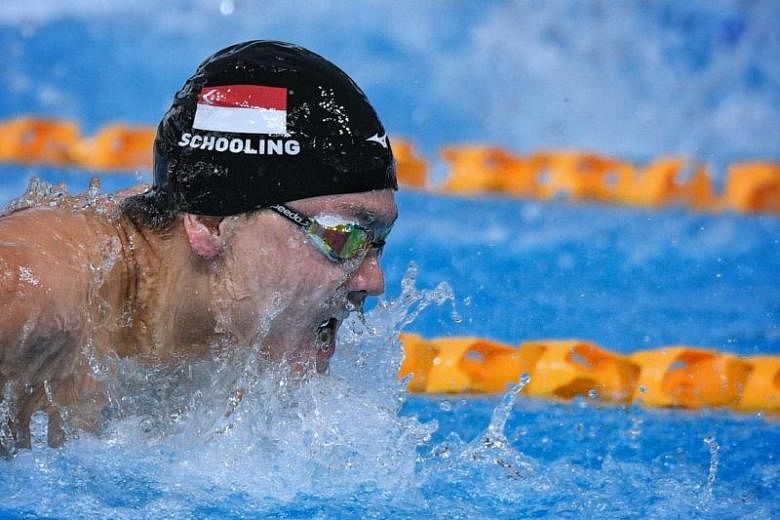The life of Joseph Schooling has always been distilled to a single word. Fast. This is who he is and how he will be remembered. Forget money, dismiss fame, all people will ask when he is done is:
Did he go fast enough?
At the right time? In the right place? Against the right people?
So far Schooling has mostly got the fast business right. He was faster than the greatest swimmer ever at the greatest time possible in Rio in 2016. At the appointed hour, he took the fewest seconds to finish 100 metres of Olympic butterfly. We gave him a parade, patted him on his back, said "what a lovely medal" and now we ask:
So then, how fast are you going to go at the next Olympics?
Fast in 2020 is Schooling's never-ending mission, his constant pressure and our incessant expectation. It's why he has to careful. About where to swim and when to swim on his way to be the fastest man in Tokyo.
Among the many elements of sporting success - diet, coach, willpower, science - the one often least discussed is scheduling. Roger Federer was always adept at it, taking breaks, choosing when to play, even skipping the French Open last year and then winning Wimbledon. It's why he is a long-term legend.
No one can be great all the time or go fast all the time. Not even Usain Bolt, whose agent, Ricky Simms, said in January 2010 that the runner wasn't going to be at the Commonwealth Games in October that year. "His priorities have to lie elsewhere," Simms told an English newspaper. "First and foremost is his four-year plan leading up to the next Olympics (in London 2012)."
The best athletes respect their talent, appreciate their vincibility and treat their bodies as carefully as a violinist handles his Stradivarius. They only impersonate machines but in truth are humans who must peak at precise and particular intervals. To disrespect the limits of the body is to flirt with failure.
And so Schooling can go fast only a few times in the year. In August he wants to win three butterfly golds at the Asian Games. In late March he's chosen to swim at the NCAA Championships in America and will forfeit the Commonwealth Games in Australia in early April.
Some think it's a smart decision because to do both he would have to travel from Minneapolis to the Gold Coast, wear jet lag and transition between American short-course yards (which no one else does) to international long-course metres. Not to mention recover from the emotional exhaustion of racing Caeleb Dressel, the best swimmer in the world, in an NCAA competition that Richard Gordon, head of high performance sports at the Singapore Sports Institute, calls "closest to the Olympics in intensity".
Others think it's a sensible decision because this semester is a hectic one for Schooling, full of training and travelling and final exams and graduation. As former Olympic swimmer Mark Chay, who attended Brigham Young University, says: "It's important that he finds time to study and graduates because then next year he can be a professional swimmer who can concentrate only on swimming and rest when he wants as he aims for Tokyo 2020."
The odd critic might turn this into a simplistic college versus country argument and claim that he should forsake the NCAA Championships and opt for the Commonwealth Games. Which makes it a perfect time to ask: who and what makes Schooling fast?
It's his drive, belief, ambition and Michael Phelps. It's his mother May, dad Colin and his genes. It's his first coach Vincent Poon, this nation of pools, a love for carrot cake and the first heroes of Singapore swimming who created a racing culture. It's also a Spaniard (coach Sergio Lopez), a South African (biomechanist Ryan Hodierne), an Australian (high performance manager Sonya Porter), a Kiwi (nutritionist Kirsty Fairbairn) and more people than we can mention here.
But it's also America that made him fast. It's a university which fed him, educated him, introduced him to a culture of competitiveness, built his belief and taught him winning. It's a coach, Eddie Reese, who nurtures him and the NCAA Championships where he forged a reputation. There is no Rio gold without Singapore support and Texas tuning.
And so swimming at the NCAA this year is Schooling's duty, his repayment for a scholarship, his way of giving thanks. It's precisely the sort of character we admire in a man. He is showing Texas the best of Singapore.
No exception is being made for Schooling, for the Quah siblings will be skipping the Commonwealth Games as well. It is a move that shows a flexibility in thinking and eventually we have to trust swimmers and their teams. Trust their scheduling. Trust their judgment. Trust their plans. Trust that as they did in Rio, they still know their way to fast.


